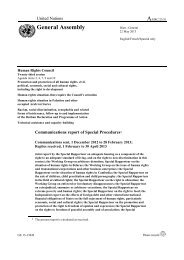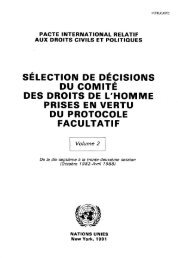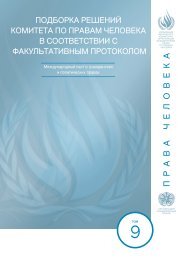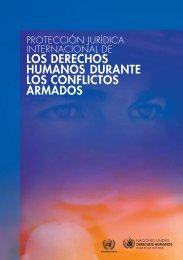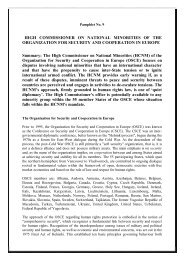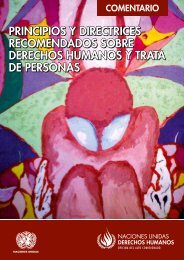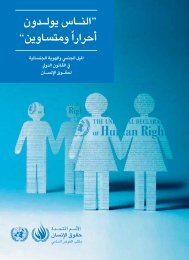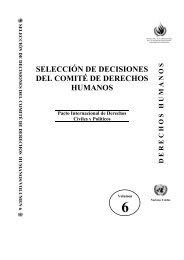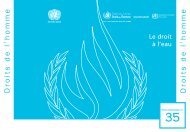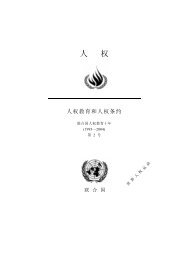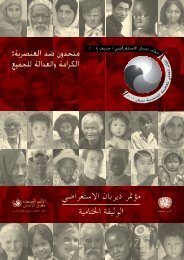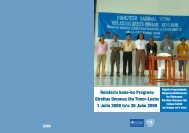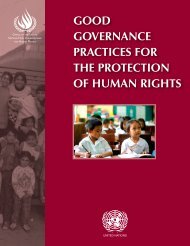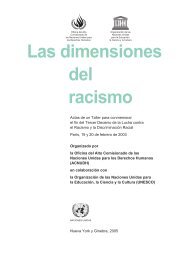Human Rights in Action (PDF) - Office of the High Commissioner for ...
Human Rights in Action (PDF) - Office of the High Commissioner for ...
Human Rights in Action (PDF) - Office of the High Commissioner for ...
You also want an ePaper? Increase the reach of your titles
YUMPU automatically turns print PDFs into web optimized ePapers that Google loves.
OHCHRterra<strong>in</strong>20x20 V10 16/07/03 14:48 Page 1<br />
OHCHR<br />
<strong>Human</strong> rights<br />
<strong>in</strong> action<br />
Promot<strong>in</strong>g<br />
and Protect<strong>in</strong>g <strong>Rights</strong><br />
Around <strong>the</strong> World<br />
The <strong>Office</strong><br />
<strong>of</strong> <strong>the</strong> United<br />
Nations <strong>High</strong><br />
<strong>Commissioner</strong> <strong>for</strong><br />
<strong>Human</strong> <strong>Rights</strong>
OHCHRterra<strong>in</strong>20x20 V10 16/07/03 14:48 Page 2
OHCHRterra<strong>in</strong>20x20 V10 16/07/03 14:48 Page 3<br />
OHCHR<br />
Preface<br />
This pamphlet is <strong>in</strong>tended to <strong>in</strong>troduce you to <strong>the</strong> work <strong>of</strong> my <strong>of</strong>fice <strong>in</strong> meet<strong>in</strong>g <strong>the</strong> greatest<br />
challenge fac<strong>in</strong>g human rights today: translat<strong>in</strong>g <strong>in</strong>ternational human rights standards <strong>in</strong>to<br />
national laws and practices. The protection and promotion <strong>of</strong> human rights have only a limited<br />
life <strong>in</strong> <strong>the</strong> legal phras<strong>in</strong>gs <strong>of</strong> treaties; <strong>the</strong>y must be given mean<strong>in</strong>g <strong>in</strong> <strong>in</strong>dividual lives. When<br />
I accepted this position, I tried to put <strong>the</strong> challenge as starkly as I could: “Ensur<strong>in</strong>g that human<br />
rights are atta<strong>in</strong>able by those who need <strong>the</strong>m most — <strong>the</strong> victims <strong>of</strong> human rights violations —<br />
is what gives <strong>the</strong> United Nations mean<strong>in</strong>g.”<br />
After <strong>the</strong> adoption <strong>of</strong> <strong>the</strong> Universal Declaration <strong>of</strong> <strong>Human</strong> <strong>Rights</strong> <strong>in</strong> 1948, <strong>the</strong> United Nations<br />
set about draft<strong>in</strong>g <strong>in</strong>ternational human rights <strong>in</strong>struments. As <strong>the</strong> six core treaties began to be<br />
widely ratified and entered <strong>in</strong>to <strong>for</strong>ce, “treaty bodies” were created to review how states were<br />
do<strong>in</strong>g at meet<strong>in</strong>g <strong>the</strong>ir commitments. The treaty bodies, staffed by <strong>in</strong>dependent experts,<br />
worked to engage Governments <strong>in</strong> constructive dialogue on human rights and to enable <strong>the</strong><br />
progressive application <strong>of</strong> <strong>in</strong>ternational norms. The UN Commission on <strong>Human</strong> <strong>Rights</strong> also<br />
established rapid response mechanisms — <strong>the</strong> Special Rapporteurs and o<strong>the</strong>r “special procedures”<br />
— to <strong>in</strong>vestigate major human rights violations and recommend what to do about <strong>the</strong>m.<br />
My <strong>of</strong>fice was created after <strong>the</strong> World Conference on <strong>Human</strong> <strong>Rights</strong> held <strong>in</strong> Vienna <strong>in</strong> 1993.<br />
This represented a fur<strong>the</strong>r step <strong>in</strong> recogniz<strong>in</strong>g <strong>the</strong> centrality <strong>of</strong> human rights to secur<strong>in</strong>g a better<br />
global future. It was meant to be a proactive, practically oriented <strong>of</strong>fice; I <strong>in</strong>tend to make it<br />
more so. The highest priority <strong>of</strong> <strong>the</strong> <strong>Office</strong> <strong>of</strong> <strong>the</strong> <strong>High</strong> <strong>Commissioner</strong> <strong>for</strong> <strong>Human</strong> <strong>Rights</strong> is <strong>the</strong><br />
realisation, <strong>in</strong> practical terms, <strong>of</strong> human rights at <strong>the</strong> country level. This is accomplished<br />
through technical co-operation projects, field presences and o<strong>the</strong>r activities aimed at creat<strong>in</strong>g<br />
or streng<strong>the</strong>n<strong>in</strong>g national systems <strong>for</strong> <strong>the</strong> protection and promotion <strong>of</strong> human rights <strong>in</strong> cooperation<br />
with Governments, national and regional partners and with UN country teams.<br />
My <strong>of</strong>fice cannot do much on its own. Most <strong>of</strong> our ef<strong>for</strong>ts, as will be seen <strong>in</strong> <strong>the</strong> follow<strong>in</strong>g<br />
pages, seek to <strong>in</strong>spire, organize, <strong>in</strong><strong>for</strong>m and extend <strong>the</strong> work <strong>of</strong> governments, above all — as<br />
well as regional and non-governmental organisations and UN country teams — as we strive<br />
toward <strong>the</strong> common goal <strong>of</strong> protect<strong>in</strong>g <strong>the</strong> human rights <strong>of</strong> <strong>in</strong>dividuals across <strong>the</strong> globe. The<br />
work is <strong>in</strong>complete, <strong>of</strong> course, but I hope you will agree that we have made a good beg<strong>in</strong>n<strong>in</strong>g.<br />
<strong>Human</strong><br />
rights<br />
<strong>in</strong> action<br />
3<br />
The <strong>Office</strong> <strong>of</strong><br />
<strong>the</strong> United Nations<br />
<strong>High</strong> <strong>Commissioner</strong> <strong>for</strong><br />
<strong>Human</strong> <strong>Rights</strong><br />
Sergio Vieira de Mello, <strong>High</strong> <strong>Commissioner</strong> <strong>for</strong> <strong>Human</strong> <strong>Rights</strong>
OHCHRterra<strong>in</strong>20x20 V10 16/07/03 14:48 Page 4<br />
Promotion:<br />
<strong>the</strong> Role <strong>of</strong> Technical<br />
Cooperation<br />
<strong>Human</strong><br />
rights<br />
<strong>in</strong> action<br />
4<br />
Field <strong>Action</strong><br />
Thousands <strong>of</strong> <strong>in</strong>ternally displaced persons<br />
live <strong>in</strong> <strong>the</strong> “Nelson Mandela” neighbourhood <strong>in</strong><br />
Cartagena, Colombia. OHCHR, along with UNHCR,<br />
work on protection issues here, The area has also<br />
been visited by several Special Rapporteurs on<br />
mandates as varied as violence aga<strong>in</strong>st women and<br />
children <strong>in</strong> armed conflict.<br />
What is technical<br />
cooperation?<br />
<strong>Human</strong> rights have little<br />
value if <strong>the</strong>y are not<br />
implemented. States recover<strong>in</strong>g<br />
from conflict or lack<strong>in</strong>g<br />
human rights expertise <strong>of</strong>ten need help <strong>in</strong><br />
implement<strong>in</strong>g <strong>the</strong>ir human rights obligations by<br />
translat<strong>in</strong>g <strong>the</strong>m <strong>in</strong>to laws and practices. The <strong>Office</strong><br />
<strong>of</strong> <strong>the</strong> <strong>High</strong> <strong>Commissioner</strong> <strong>for</strong> <strong>Human</strong> <strong>Rights</strong><br />
devotes much <strong>of</strong> its resources — through its Technical<br />
Cooperation Programme — to support<strong>in</strong>g States’<br />
ef<strong>for</strong>ts <strong>in</strong> this regard. The Programme helps countries<br />
to apply <strong>in</strong>ternational human rights norms at<br />
<strong>the</strong> national level. It provides practical assistance<br />
<strong>for</strong> <strong>the</strong> build<strong>in</strong>g and streng<strong>the</strong>n<strong>in</strong>g <strong>of</strong> <strong>in</strong>stitutions<br />
which have a direct impact on <strong>the</strong> promotion and<br />
protection <strong>of</strong> human rights and <strong>the</strong> rule <strong>of</strong> law.<br />
Priority areas <strong>for</strong> action are recommended by <strong>the</strong><br />
bodies charged with monitor<strong>in</strong>g States’ compliance<br />
with <strong>in</strong>ternational treaties (<strong>the</strong> “treaty bodies”) and<br />
<strong>the</strong> mechanisms <strong>of</strong> <strong>the</strong> United Nations’ Commission
OHCHRterra<strong>in</strong>20x20 V10 16/07/03 14:48 Page 5<br />
on <strong>Human</strong> <strong>Rights</strong> (particularly <strong>the</strong> “special procedures” described below).<br />
OHCHR works closely with partners, especially UN Country Teams, state and<br />
national <strong>in</strong>stitutions and civil society organizations.<br />
The Technical Cooperation Programme is funded<br />
primarily through <strong>the</strong> UN Voluntary Fund <strong>for</strong><br />
Technical Cooperation <strong>in</strong> <strong>the</strong> Field <strong>of</strong> <strong>Human</strong> <strong>Rights</strong>.<br />
In 2002, a total <strong>of</strong> US$11 million was spent on technical<br />
cooperation activities, <strong>of</strong> which US$10 million came from what are called<br />
“voluntary contributions.” These funds exist outside <strong>the</strong> regular UN budget.<br />
In order to benefit from <strong>the</strong> Programme, a Government must submit a request<br />
<strong>for</strong> support to OHCHR, which <strong>the</strong>n carries out an assessment <strong>of</strong> <strong>the</strong> country's<br />
human rights needs. This needs assessment is normally conducted through a<br />
mission to <strong>the</strong> State; it <strong>in</strong>volves consultations with <strong>the</strong> Government and o<strong>the</strong>r<br />
partners, <strong>in</strong>clud<strong>in</strong>g Parliament, <strong>the</strong> courts, civil society and UN Country Teams<br />
(UNCTs). Once <strong>the</strong> assessment has been completed, a project is <strong>for</strong>mulated<br />
that identifies areas <strong>in</strong> need <strong>of</strong> improvement and outl<strong>in</strong>es a comprehensive<br />
strategy <strong>for</strong> action. The project is reviewed closely dur<strong>in</strong>g implementation and,<br />
once completed, <strong>the</strong>re is an <strong>in</strong>dependent evaluation to measure <strong>the</strong> success<br />
<strong>of</strong> <strong>the</strong> programme and, where necessary, develop a plan <strong>for</strong> fur<strong>the</strong>r action.<br />
OHCHR will <strong>in</strong>creas<strong>in</strong>gly rely on external partners to implement <strong>the</strong>se activities,<br />
especially UNCTs. OHCHR will ensure direct implementation <strong>of</strong> <strong>the</strong>se<br />
activities only when o<strong>the</strong>r partners are unable to do so.<br />
How does technical<br />
cooperation work <strong>in</strong> practice?<br />
What k<strong>in</strong>d <strong>of</strong> technical<br />
cooperation activities are<br />
undertaken by OHCHR?<br />
Each project is requested by and tailored to <strong>the</strong><br />
needs <strong>of</strong> <strong>the</strong> beneficiary country. Assistance<br />
may be provided <strong>in</strong> <strong>the</strong> follow<strong>in</strong>g areas.<br />
National Parliaments:<br />
OHCHR supports<br />
Parliaments <strong>in</strong> discharg<strong>in</strong>g <strong>the</strong>ir human rights<br />
functions, address<strong>in</strong>g a variety <strong>of</strong> issues, <strong>in</strong>clud<strong>in</strong>g <strong>the</strong> development <strong>of</strong><br />
national human rights action plans, <strong>the</strong> role <strong>of</strong> parliamentary human rights<br />
committees and <strong>the</strong> technical processes <strong>of</strong> sign<strong>in</strong>g up to <strong>in</strong>ternational<br />
human rights treaties.<br />
<strong>Human</strong><br />
rights<br />
<strong>in</strong> action<br />
5
OHCHRterra<strong>in</strong>20x20 V10 16/07/03 14:49 Page 6<br />
FIELD PRESENCE<br />
<strong>Human</strong><br />
rights<br />
<strong>in</strong> action<br />
6<br />
OHCHR’s <strong>of</strong>fice <strong>in</strong> Bogotá was established <strong>in</strong> 1996 to<br />
observe and monitor <strong>the</strong> Colombian situation and to<br />
advise <strong>the</strong> Colombian authorities on how to promote and<br />
protect human rights <strong>in</strong> <strong>the</strong> context <strong>of</strong> <strong>in</strong>ternal armed<br />
conflict. OHCHR activities have <strong>in</strong>cluded: observ<strong>in</strong>g,<br />
monitor<strong>in</strong>g and provid<strong>in</strong>g analytical reports to <strong>the</strong> <strong>High</strong><br />
<strong>Commissioner</strong> with a view to ensur<strong>in</strong>g that <strong>the</strong> <strong>in</strong>ternational<br />
community is aware <strong>of</strong> <strong>the</strong> human rights situation <strong>in</strong><br />
Colombia; advis<strong>in</strong>g <strong>the</strong> Colombian authorities on <strong>the</strong><br />
<strong>for</strong>mulation and implementation <strong>of</strong> policies to promote and<br />
protect human rights; provid<strong>in</strong>g technical assistance to<br />
selected State and non-governmental <strong>in</strong>stitutions to<br />
streng<strong>the</strong>n national capacity <strong>in</strong> human rights protection; and<br />
promot<strong>in</strong>g human rights through publications and<br />
awareness-rais<strong>in</strong>g campaigns. This strategy allows <strong>the</strong> <strong>of</strong>fice<br />
to highlight human rights topics and raise <strong>the</strong> level <strong>of</strong><br />
discussion with<strong>in</strong> Colombian society, especially among<br />
policy-makers.<br />
Internally<br />
displaced persons<br />
<strong>in</strong> Choco.<br />
Colombia<br />
In Choco, a department<br />
border<strong>in</strong>g Panama,<br />
OHCHR was asked to<br />
give conclusions and<br />
recommendations<br />
concern<strong>in</strong>g <strong>the</strong> kill<strong>in</strong>g <strong>of</strong><br />
120 black civilians who<br />
took refuge <strong>in</strong> a church.<br />
The plight <strong>of</strong> <strong>the</strong> black<br />
IDPs <strong>of</strong> Chocos touches<br />
upon many <strong>of</strong> <strong>the</strong> issues<br />
addressed by OHCHR,<br />
such as racism, extreme<br />
poverty, <strong>the</strong> right to<br />
development and <strong>the</strong><br />
protection <strong>of</strong> civilians <strong>in</strong><br />
armed conflict.<br />
A destroyed classroom<br />
after a guerrilla fight<br />
<strong>in</strong> Selvas del Chocos.
OHCHRterra<strong>in</strong>20x20 V10 16/07/03 14:49 Page 7<br />
Staff <strong>of</strong> <strong>the</strong> OHCHR<br />
Mission <strong>in</strong> Serbia and<br />
Montenegro meet<strong>in</strong>g<br />
victims <strong>of</strong> police illtreatment<br />
<strong>in</strong> Ugao village,<br />
Sandzak region, Serbia,<br />
April 2002. Identify<strong>in</strong>g<br />
and expos<strong>in</strong>g serious<br />
human rights violations<br />
plays an important part<br />
<strong>of</strong> <strong>the</strong> <strong>of</strong>fice’s field<br />
operations. Countries<br />
mov<strong>in</strong>g from conflict must<br />
deal with difficult<br />
questions <strong>of</strong> impunity or<br />
accountability <strong>for</strong> acts <strong>of</strong><br />
<strong>the</strong> past, particularly<br />
among <strong>the</strong> armed <strong>for</strong>ces<br />
and <strong>the</strong> police.<br />
Staff from a Sierra<br />
Leone regional human<br />
rights <strong>of</strong>fice assist<strong>in</strong>g a<br />
team <strong>of</strong> <strong>for</strong>ensic experts<br />
to map mass graves <strong>in</strong><br />
<strong>the</strong> village <strong>of</strong> Mende<br />
Kelema. Villagers gave<br />
testimonies to <strong>the</strong><br />
experts, <strong>the</strong> first team to<br />
visit <strong>the</strong> country,<br />
who <strong>the</strong>n traced <strong>the</strong><br />
gravesites us<strong>in</strong>g GPS<br />
(global position<strong>in</strong>g<br />
system).<br />
Field <strong>Action</strong><br />
Legislation: OHCHR assists Governments <strong>in</strong> <strong>the</strong><br />
re<strong>for</strong>m <strong>of</strong> legislation that has a clear impact on<br />
<strong>the</strong> situation <strong>of</strong> human rights, <strong>the</strong>reby ensur<strong>in</strong>g<br />
that laws are brought <strong>in</strong>to con<strong>for</strong>mity with <strong>in</strong>ternational<br />
human rights standards. Drafts provided<br />
by a Government are reviewed and recommendations<br />
made.<br />
Constitutions: OHCHR provides assistance <strong>for</strong><br />
<strong>the</strong> <strong>in</strong>corporation <strong>of</strong> <strong>in</strong>ternational human rights<br />
norms <strong>in</strong> national constitutions. It can facilitate a<br />
national consensus on <strong>the</strong> elements to be <strong>in</strong>corporated <strong>in</strong> those constitutions.<br />
It may assist with advisory services, <strong>the</strong> organization <strong>of</strong> workshops,<br />
<strong>the</strong> provision <strong>of</strong> human rights <strong>in</strong><strong>for</strong>mation and documentation, or public<br />
<strong>in</strong><strong>for</strong>mation campaigns to ensure <strong>the</strong> <strong>in</strong>volvement <strong>of</strong> all sectors <strong>of</strong> society.<br />
Issues addressed <strong>in</strong> OHCHR's constitutional activities <strong>in</strong>clude legislative<br />
draft<strong>in</strong>g and constitutional law; <strong>the</strong> draft<strong>in</strong>g <strong>of</strong> bills <strong>of</strong> rights; <strong>the</strong> provision<br />
<strong>of</strong> justiciable remedies under <strong>the</strong> law; options <strong>for</strong> <strong>the</strong> allocation and separation<br />
<strong>of</strong> governmental powers; <strong>the</strong> <strong>in</strong>dependence <strong>of</strong> <strong>the</strong> judiciary; and<br />
<strong>the</strong> role <strong>of</strong> <strong>the</strong> judiciary <strong>in</strong> oversee<strong>in</strong>g <strong>the</strong> police and prison systems.<br />
National <strong>in</strong>stitutions: OHCHR assists <strong>in</strong> <strong>the</strong><br />
creation <strong>of</strong> <strong>in</strong>dependent national human rights<br />
<strong>in</strong>stitutions, which play an important role <strong>in</strong> <strong>the</strong><br />
promotion and protection <strong>of</strong> human rights at <strong>the</strong><br />
national level. OHCHR’s work <strong>in</strong> this area is guided<br />
by <strong>the</strong> Paris Pr<strong>in</strong>ciples, adopted by <strong>the</strong> General<br />
Assembly <strong>in</strong> 1993, which represent <strong>the</strong> benchmark<br />
aga<strong>in</strong>st which national <strong>in</strong>stitutions are<br />
measured. The Paris Pr<strong>in</strong>ciples provide important<br />
guidance on such issues as legislation; composition<br />
and <strong>in</strong>dependence; competencies and responsibilities;<br />
handl<strong>in</strong>g <strong>of</strong> compla<strong>in</strong>ts; and methods<br />
<strong>of</strong> operation, <strong>in</strong>clud<strong>in</strong>g how national human<br />
<strong>Human</strong><br />
rights<br />
<strong>in</strong> action<br />
7
OHCHRterra<strong>in</strong>20x20 V10 16/07/03 14:49 Page 8<br />
<strong>Human</strong><br />
rights<br />
<strong>in</strong> action<br />
8<br />
In <strong>the</strong> Lacluta Viqueque subdistrict<br />
<strong>of</strong> Timor Leste, n<strong>in</strong>e men,<br />
perpetrators <strong>of</strong> past human rights<br />
violations, have addressed <strong>the</strong><br />
Reception, Truth and<br />
Reconciliation Commission <strong>in</strong> order<br />
to be re-<strong>in</strong>tegrated <strong>in</strong>to <strong>the</strong>ir<br />
community. The Regional<br />
<strong>Commissioner</strong> and elders enter<br />
<strong>in</strong>to a dialogue with <strong>the</strong><br />
perpetrators and with <strong>the</strong>ir victims.<br />
After discussion and a ritual, <strong>the</strong><br />
n<strong>in</strong>e men, who must disclose <strong>the</strong>ir<br />
actions and denounce any fur<strong>the</strong>r<br />
violence, are reconciled with <strong>the</strong>ir<br />
people and ordered to carry out<br />
community work. The <strong>Human</strong><br />
<strong>Rights</strong> Section <strong>of</strong> UNMISET is<br />
work<strong>in</strong>g with <strong>the</strong> Commission.<br />
Field <strong>Action</strong><br />
rights <strong>in</strong>stitutions should <strong>in</strong>teract with Government<br />
and civil society.<br />
OHCHR works with some 50 countries on this<br />
issue <strong>in</strong> cooperation with <strong>the</strong> United Nations<br />
Development Program and a wide array <strong>of</strong> partners.<br />
It supports <strong>the</strong> shar<strong>in</strong>g <strong>of</strong> best practices<br />
among national <strong>in</strong>stitutions and <strong>the</strong>ir <strong>in</strong>volvement<br />
<strong>in</strong> UN and o<strong>the</strong>r <strong>in</strong>ternational and regional <strong>for</strong>a;<br />
promotes <strong>the</strong> establishment <strong>of</strong> regional networks<br />
<strong>of</strong> national <strong>in</strong>stitutions; and encourages treaty<br />
bodies and special procedures to turn to national<br />
<strong>in</strong>stitutions as sources <strong>of</strong> expertise and country<br />
knowledge <strong>in</strong> order to ensure follow-up to <strong>the</strong>ir<br />
recommendations. OHCHR has also issued a<br />
practical manual <strong>for</strong> those <strong>in</strong>volved <strong>in</strong> <strong>the</strong> establishment<br />
and adm<strong>in</strong>istration <strong>of</strong> national <strong>in</strong>stitutions<br />
and has organized sem<strong>in</strong>ars to guide government<br />
<strong>of</strong>ficials <strong>in</strong> <strong>the</strong> structure and function<strong>in</strong>g<br />
<strong>of</strong> such bodies.<br />
Adm<strong>in</strong>istration <strong>of</strong> justice: OHCHR provides orientation<br />
and tra<strong>in</strong><strong>in</strong>g courses <strong>for</strong> judges, lawyers, prosecutors, police <strong>of</strong>ficers<br />
and prison personnel. Such courses allow participants to become<br />
more familiar with <strong>the</strong> human rights standards that apply to <strong>the</strong> adm<strong>in</strong>istration<br />
<strong>of</strong> justice, as well as humane and effective techniques <strong>for</strong> <strong>the</strong> per<strong>for</strong>mance<br />
<strong>of</strong> law en<strong>for</strong>cement, penal and judicial functions. These courses<br />
also equip participants with <strong>the</strong> knowledge necessary to <strong>in</strong>corporate<br />
human rights <strong>in</strong>to <strong>the</strong>ir own countries’ manuals and tra<strong>in</strong><strong>in</strong>g activities and<br />
to review exist<strong>in</strong>g regulations and practices to ensure con<strong>for</strong>mity with<br />
human rights standards.<br />
<strong>Human</strong> rights education: <strong>Human</strong> rights education enhances knowledge<br />
about human rights and <strong>the</strong> mechanisms <strong>for</strong> <strong>the</strong>ir protection. It also promotes<br />
values, beliefs and attitudes that encourage <strong>in</strong>dividuals to uphold
OHCHRterra<strong>in</strong>20x20 V10 16/07/03 14:49 Page 9<br />
Cambodia<br />
The Cambodia <strong>of</strong>fice was established <strong>in</strong> 1993 with a<br />
mandate that comb<strong>in</strong>es technical assistance,<br />
monitor<strong>in</strong>g and protection. Activities focus on<br />
streng<strong>the</strong>n<strong>in</strong>g government <strong>in</strong>stitutions, non-governmental<br />
organisations and civil society. OHCHR has helped <strong>the</strong><br />
Government to establish <strong>in</strong>stitutions and a legal<br />
framework consistent with <strong>in</strong>ternational human rights<br />
standards. It has helped to streng<strong>the</strong>n judicial re<strong>for</strong>m<br />
ef<strong>for</strong>ts and <strong>the</strong> justice system to ensure human rights<br />
are promoted and protected under <strong>the</strong> rule <strong>of</strong> law; to<br />
ensure fair and pr<strong>of</strong>essional law en<strong>for</strong>cement, consistent<br />
with human rights standards; and to enhance <strong>the</strong><br />
Non <strong>for</strong>mal education <strong>for</strong> street<br />
capacity <strong>of</strong> <strong>the</strong> Government to meet its <strong>in</strong>ternational<br />
children. Street children and<br />
human rights treaty report<strong>in</strong>g obligations. OHCHR works<br />
children from slums attend<br />
classes run by local non<br />
to develop <strong>the</strong> capacity <strong>of</strong> Cambodian NGOs and civil<br />
governmental organizations at a<br />
society organisations to carry out human rights<br />
makeshift school on <strong>the</strong> premises<br />
protection and promotion activities. Current attention is<br />
<strong>of</strong> a Buddhist temple <strong>in</strong> Phnom<br />
Penh. Due to pervasive poverty<br />
focused on streng<strong>the</strong>n<strong>in</strong>g NGO capacity to promote and<br />
and <strong>the</strong> relatively high cost <strong>of</strong><br />
protect economic, social and cultural rights and <strong>the</strong><br />
education, many Cambodian children are unable to<br />
human rights <strong>of</strong><br />
complete school. Programmes <strong>of</strong> this k<strong>in</strong>d are<br />
<strong>of</strong>ten <strong>the</strong> only opportunity <strong>for</strong> learn<strong>in</strong>g <strong>for</strong> <strong>the</strong>se<br />
vulnerable groups. 9<br />
Economic, social and cultural rights. This<br />
workshop, held by OHCHR-Cambodia <strong>in</strong><br />
January 2002, brought toge<strong>the</strong>r<br />
Cambodian human rights and<br />
development NGOs to be tra<strong>in</strong>ed on<br />
monitor<strong>in</strong>g and document<strong>in</strong>g violations <strong>of</strong><br />
economic, social and cultural rights and<br />
develop strategies to advance <strong>the</strong>m.<br />
Education, health, hous<strong>in</strong>g and land<br />
rights were specifically discussed. The<br />
workshop was such a success that <strong>the</strong><br />
NGOs set up <strong>the</strong>ir own Monitor<strong>in</strong>g<br />
Committee, conducted surveys <strong>in</strong> several<br />
prov<strong>in</strong>ces, and prepared a parallel report<br />
on <strong>the</strong> implementation <strong>of</strong> <strong>the</strong><br />
International Covenant on Economic<br />
Social and Cultural <strong>Rights</strong>.<br />
children. OHCHR-Cambodia assisted <strong>the</strong> Special<br />
Representative <strong>of</strong> <strong>the</strong> Secretary General <strong>for</strong> <strong>Human</strong><br />
<strong>Rights</strong> <strong>in</strong> Cambodia <strong>in</strong> conduct<strong>in</strong>g an assessment <strong>of</strong><br />
<strong>the</strong> right to education and mak<strong>in</strong>g<br />
recommendations to streng<strong>the</strong>n its implementation.<br />
FIELD PRESENCE<br />
<strong>Human</strong><br />
rights<br />
<strong>in</strong> action
OHCHRterra<strong>in</strong>20x20 V10 16/07/03 14:49 Page 10<br />
<strong>Human</strong> <strong>Rights</strong> and <strong>the</strong> Military<br />
It is essential <strong>for</strong> <strong>the</strong> good function<strong>in</strong>g <strong>of</strong> <strong>the</strong> rule <strong>of</strong> law that<br />
<strong>the</strong> armed <strong>for</strong>ces be bound by <strong>the</strong> Constitution and o<strong>the</strong>r laws<br />
<strong>of</strong> <strong>the</strong> land, that <strong>the</strong>y answer to a democratic Government and<br />
that <strong>the</strong>y are tra<strong>in</strong>ed <strong>in</strong> and committed to human rights and<br />
humanitarian law. While traditional military tra<strong>in</strong><strong>in</strong>g <strong>of</strong>ten<br />
<strong>in</strong>cludes attention to <strong>the</strong> laws <strong>of</strong> war, <strong>in</strong>clud<strong>in</strong>g <strong>the</strong> four Geneva<br />
Conventions, specific tra<strong>in</strong><strong>in</strong>g <strong>in</strong> <strong>the</strong> area <strong>of</strong> human rights is<br />
also necessary. OHCHR’s approach to military tra<strong>in</strong><strong>in</strong>g is based<br />
on two ma<strong>in</strong> precepts: First, <strong>in</strong>ternational human rights<br />
standards do apply <strong>in</strong> situations <strong>of</strong> armed conflict, <strong>in</strong> addition<br />
to humanitarian law. Second, <strong>the</strong> duties <strong>of</strong> modern pr<strong>of</strong>essional<br />
soldiers <strong>in</strong>creas<strong>in</strong>gly <strong>in</strong>clude civil polic<strong>in</strong>g duties, <strong>the</strong><br />
ma<strong>in</strong>tenance <strong>of</strong> order and public safety under states <strong>of</strong><br />
emergency, and assignment to <strong>in</strong>ternational peace-keep<strong>in</strong>g<br />
operations. The effective, pr<strong>of</strong>essional and humane<br />
per<strong>for</strong>mance <strong>of</strong> <strong>the</strong>se duties requires a knowledge <strong>of</strong>, and<br />
sensitization to, <strong>in</strong>ternational human rights standards, as well<br />
as <strong>the</strong> skills to apply <strong>the</strong>m <strong>in</strong> <strong>the</strong> daily work <strong>of</strong> <strong>the</strong> military.<br />
<strong>Human</strong><br />
rights<br />
<strong>in</strong> action<br />
10<br />
Sia Mondeh was ten years old<br />
when she was abducted by an<br />
alleged <strong>for</strong>mer RUF combatant.<br />
Her case was reported to staff<br />
from <strong>the</strong> Kenema <strong>of</strong>fice <strong>of</strong><br />
UNAMSIL (Sierra Leone) while<br />
<strong>the</strong>y were on patrol. An<br />
<strong>in</strong>vestigation was opened and<br />
<strong>the</strong> girl was found <strong>in</strong> Puhejun<br />
village, Tongo field. She, as well<br />
as <strong>the</strong> surround<strong>in</strong>g community,<br />
confirmed that she was be<strong>in</strong>g<br />
treated as a slave. The human<br />
rights <strong>of</strong>ficers, with <strong>the</strong> help <strong>of</strong><br />
<strong>the</strong> police and NGOs, managed<br />
to get <strong>the</strong> girl out <strong>of</strong> <strong>the</strong> family<br />
where she was be<strong>in</strong>g held. She<br />
was brought to Kenema where<br />
her family was traced <strong>in</strong> Kaima,<br />
Sando Chiefdom, and was<br />
recently reunited with <strong>the</strong>m<br />
after six years <strong>of</strong> separation.<br />
Field <strong>Action</strong><br />
<strong>the</strong>ir own rights and those <strong>of</strong> o<strong>the</strong>rs. Education<br />
makes an essential contribution to <strong>the</strong> prevention<br />
<strong>of</strong> human rights abuses and conflict and helps<br />
create a society <strong>in</strong> which all persons are valued<br />
and respected.<br />
OHCHR’s work <strong>in</strong> this area focuses on <strong>the</strong> follow<strong>in</strong>g:<br />
• Develop<strong>in</strong>g human rights tra<strong>in</strong><strong>in</strong>g and educational<br />
materials, such as manuals <strong>for</strong> teachers<br />
<strong>in</strong> primary and secondary schools, judges,<br />
prosecutors and lawyers, prison <strong>of</strong>ficials and<br />
human rights monitors;<br />
• Facilitat<strong>in</strong>g <strong>in</strong><strong>for</strong>mation-shar<strong>in</strong>g and network<strong>in</strong>g<br />
among human rights education actors through<br />
activities such as <strong>the</strong> development <strong>of</strong> OHCHR’s<br />
Database and Resource Collection on <strong>Human</strong><br />
<strong>Rights</strong> Education; <strong>the</strong> organization <strong>of</strong> events to
OHCHRterra<strong>in</strong>20x20 V10 16/07/03 14:49 Page 11<br />
Field <strong>Action</strong><br />
Hous<strong>in</strong>g: follow<strong>in</strong>g two fires at<br />
squatter settlements <strong>in</strong> Phnom<br />
Penh <strong>in</strong> November 2001,<br />
3,300 families were relocated to<br />
Anlung Krognam area, some<br />
15 kilometres from Phnom Penh.<br />
The resettlement site was an<br />
undeveloped flood pla<strong>in</strong>, with<br />
<strong>in</strong>adequate sanitation, water<br />
supply, access to education and<br />
health facilities, food and <strong>in</strong>come opportunities. OHCHR-Cambodia, <strong>in</strong><br />
cooperation with UN Habitat and Cambodian NGOs, has been work<strong>in</strong>g to<br />
improve <strong>the</strong> situation <strong>of</strong> <strong>the</strong> relocated families. In June 2002, <strong>the</strong><br />
Special Representative <strong>of</strong> <strong>the</strong> Secretary-General <strong>for</strong> <strong>Human</strong> <strong>Rights</strong> <strong>in</strong><br />
Cambodia visited <strong>the</strong> relocation site and met with <strong>the</strong> concerned<br />
communities. He <strong>the</strong>n raised <strong>the</strong> issue <strong>of</strong> <strong>the</strong>ir poor conditions with <strong>the</strong><br />
Government, and obta<strong>in</strong>ed commitments that <strong>for</strong>ced evictions would not<br />
reoccur, that land-shar<strong>in</strong>g and upgrad<strong>in</strong>g <strong>of</strong> exist<strong>in</strong>g settlements would<br />
be used as an alternative to large-scale relocations, and that proper<br />
consultation with <strong>the</strong> affected communities would take place if ever<br />
relocation is necessary.<br />
In mid 2002, OHCHR<br />
and UNDP launched its<br />
first jo<strong>in</strong>t project <strong>in</strong><br />
Bosnia and Herzegov<strong>in</strong>a<br />
aimed at assess<strong>in</strong>g<br />
development at <strong>the</strong><br />
municipal level through<br />
a rights-based<br />
approach. In <strong>the</strong><br />
absence <strong>of</strong> consolidated<br />
and public reports on <strong>the</strong> human rights<br />
situation at <strong>the</strong> grass roots level, <strong>the</strong><br />
<strong>Rights</strong>-based Municipal Assessments<br />
Project will play a crucial role <strong>in</strong> future<br />
development programm<strong>in</strong>g across <strong>the</strong><br />
country. Sixteen National RMAP Assessment<br />
<strong>Office</strong>rs were tra<strong>in</strong>ed <strong>in</strong> Sarajevo October<br />
2002 and deployed to six municipalities <strong>for</strong><br />
three months. Over <strong>the</strong> next 2.5 year,<br />
teams will assess 48 municipalities<br />
throughout Bosnia and Herzegov<strong>in</strong>a.<br />
<strong>in</strong>itiate and streng<strong>the</strong>n activities with a human<br />
rights education focus; and <strong>the</strong> provision <strong>of</strong><br />
support to activities organized by partners;<br />
• Develop<strong>in</strong>g country technical cooperation projects<br />
that <strong>in</strong>clude human rights education and<br />
tra<strong>in</strong><strong>in</strong>g components;<br />
• Support<strong>in</strong>g local ef<strong>for</strong>ts <strong>for</strong> human rights education<br />
through <strong>the</strong> Assist<strong>in</strong>g Communities<br />
Toge<strong>the</strong>r project, which provides f<strong>in</strong>ancial<br />
assistance to grass-roots <strong>in</strong>itiatives (see box);<br />
• Dissem<strong>in</strong>at<strong>in</strong>g <strong>the</strong> Universal Declaration <strong>of</strong><br />
<strong>Human</strong> <strong>Rights</strong>, now available <strong>in</strong> more than<br />
320 languages.<br />
Treaty obligations: OHCHR organizes tra<strong>in</strong><strong>in</strong>g<br />
activities <strong>for</strong> government <strong>of</strong>ficials responsible <strong>for</strong><br />
prepar<strong>in</strong>g reports to <strong>the</strong> <strong>in</strong>ternational human rights<br />
<strong>Human</strong><br />
rights<br />
<strong>in</strong> action<br />
11
OHCHRterra<strong>in</strong>20x20 V10 16/07/03 14:50 Page 12<br />
FIELD PRESENCE<br />
<strong>Human</strong><br />
rights<br />
<strong>in</strong> action<br />
12<br />
Follow<strong>in</strong>g one <strong>of</strong> <strong>the</strong> most tragic armed conflicts <strong>in</strong><br />
contemporary Africa, OHCHR is provid<strong>in</strong>g strong<br />
support to <strong>the</strong> <strong>Human</strong> <strong>Rights</strong> Section <strong>of</strong> <strong>the</strong> United<br />
Nations Mission <strong>in</strong> Sierra Leone (UNAMSIL) <strong>in</strong> deal<strong>in</strong>g<br />
with past human rights violations and contribut<strong>in</strong>g to<br />
build<strong>in</strong>g a new and peaceful Sierra Leone. The year<br />
2002 was a watershed <strong>in</strong> Sierra Leone. The war was<br />
declared over and general elections took place. Civil<br />
authorities were re-established across <strong>the</strong> country.<br />
Economic activities resumed and numerous refugees<br />
and <strong>in</strong>ternally displaced persons returned to <strong>the</strong>ir<br />
homes. Dur<strong>in</strong>g <strong>the</strong> conflict, OHCHR backed <strong>the</strong> <strong>Human</strong><br />
<strong>Rights</strong> Section <strong>in</strong> monitor<strong>in</strong>g violations <strong>of</strong> human rights<br />
and <strong>in</strong>ternational humanitarian law, <strong>in</strong>clud<strong>in</strong>g atrocities<br />
committed aga<strong>in</strong>st women and children. UNAMSIL and<br />
<strong>the</strong> International Committee <strong>of</strong> <strong>the</strong> Red Cross were <strong>the</strong><br />
only <strong>in</strong>ternational actors allowed to monitor <strong>the</strong> situation<br />
<strong>of</strong> deta<strong>in</strong>ees <strong>in</strong> <strong>the</strong> prisons under <strong>the</strong> state <strong>of</strong><br />
emergency. To give <strong>the</strong> national recovery a solid<br />
foundation on <strong>in</strong>ternational human rights pr<strong>in</strong>ciples, <strong>the</strong><br />
Sierra Leone <strong>Human</strong> <strong>Rights</strong> Manifesto was signed by <strong>the</strong><br />
<strong>High</strong> <strong>Commissioner</strong>, <strong>the</strong> Government, <strong>the</strong> Special<br />
Representative <strong>of</strong> <strong>the</strong> Secretary-General, <strong>the</strong> National<br />
Commission <strong>for</strong> Democracy and <strong>Human</strong> <strong>Rights</strong> and <strong>the</strong><br />
National Forum <strong>for</strong> <strong>Human</strong> <strong>Rights</strong>, an umbrella group <strong>of</strong><br />
non-governmental organisations. The <strong>Human</strong> <strong>Rights</strong><br />
Section is back<strong>in</strong>g OHCHR <strong>in</strong> support<strong>in</strong>g <strong>the</strong><br />
establishment <strong>of</strong> a Truth and Reconciliation Commission.<br />
OHCHR has been advanc<strong>in</strong>g sensitization programs<br />
related to <strong>the</strong> Special Court established to undertake<br />
prosecutions <strong>for</strong> war crimes and crimes aga<strong>in</strong>st<br />
humanity committed dur<strong>in</strong>g <strong>the</strong> conflict, <strong>in</strong>clud<strong>in</strong>g<br />
summary executions, amputations, sexual violence<br />
Sierra Leone<br />
aga<strong>in</strong>st women and crimes aga<strong>in</strong>st children. OHCHR<br />
cont<strong>in</strong>ues to guide <strong>the</strong> <strong>Human</strong> <strong>Rights</strong> Section <strong>in</strong><br />
develop<strong>in</strong>g local capacities <strong>for</strong> <strong>the</strong> protection and<br />
promotion <strong>of</strong> human rights, both with<strong>in</strong> <strong>the</strong> State (<strong>for</strong><br />
example, streng<strong>the</strong>n<strong>in</strong>g <strong>the</strong> adm<strong>in</strong>istration <strong>of</strong> justice) and<br />
national human rights<br />
<strong>in</strong>stitutions and with<strong>in</strong><br />
civil society (by<br />
help<strong>in</strong>g, <strong>for</strong> example,<br />
new women’s<br />
organizations<br />
struggl<strong>in</strong>g aga<strong>in</strong>st<br />
harmful traditional<br />
practices and gender<br />
discrim<strong>in</strong>ation).<br />
A demonstration was organized <strong>in</strong><br />
Daru <strong>in</strong> June 2002 at <strong>the</strong> court<br />
barray. The demonstration took<br />
place just after a sensitization<br />
workshop which <strong>in</strong>cluded <strong>the</strong><br />
Regent Paramount chief Daniel<br />
Dombai Kamba, section chiefs,<br />
police, teachers, youth groups, excombatants,<br />
religious leaders,<br />
elders, and o<strong>the</strong>rs. The workshop<br />
was organized by a UNAMSIL<br />
regional human rights <strong>of</strong>fice and<br />
two local NGOs and focused on<br />
basic human rights, women’s rights,<br />
<strong>the</strong> TRC and <strong>the</strong> Special Court.<br />
Section chiefs, who came from as<br />
far as 18 miles away, promised to<br />
carry <strong>the</strong> human rights message to<br />
<strong>the</strong>ir communities.
OHCHRterra<strong>in</strong>20x20 V10 16/07/03 14:50 Page 13<br />
Field <strong>Action</strong><br />
treaty bodies. Participants are provided with<br />
methodological tools, such as OHCHR’s “Manual<br />
on <strong>Human</strong> <strong>Rights</strong> Report<strong>in</strong>g”, and can benefit from<br />
<strong>in</strong>teraction with experts from <strong>the</strong> treaty bodies as<br />
well as with specialized OHCHR staff. When possible,<br />
tra<strong>in</strong>ees may observe meet<strong>in</strong>gs <strong>of</strong> treaty bodies.<br />
Participants also engage <strong>in</strong> practical exercises<br />
that allow <strong>the</strong>m to test skills acquired dur<strong>in</strong>g <strong>the</strong><br />
course.<br />
Members <strong>of</strong> <strong>the</strong><br />
Haileslassie Bekre family<br />
who were, <strong>in</strong> 1999,<br />
deported from Addis Ababa<br />
to Eritrea after <strong>the</strong>ir<br />
identities were mistaken.<br />
Four years later, when be<strong>in</strong>g<br />
repatriated to <strong>the</strong>ir country,<br />
<strong>the</strong>y were deta<strong>in</strong>ed <strong>in</strong> <strong>the</strong><br />
buffer zone separat<strong>in</strong>g<br />
Ethiopia and Eritrea, a<br />
"no man's land" known as Zela Ambessa. Ef<strong>for</strong>ts by<br />
<strong>the</strong> UNMEE <strong>Human</strong> <strong>Rights</strong> <strong>Office</strong> enabled<br />
<strong>the</strong> sibl<strong>in</strong>gs to f<strong>in</strong>ally return home.<br />
Dur<strong>in</strong>g a field mission, <strong>the</strong><br />
Special Rapporteur and OHCHR<br />
Federal Republic <strong>of</strong> Yugoslavia<br />
Staff meet<strong>in</strong>g with <strong>the</strong> Deputy<br />
Prime M<strong>in</strong>ister <strong>of</strong> Sou<strong>the</strong>rn<br />
Serbia <strong>in</strong> Bujanovac, March<br />
2001. OHCHR can play an<br />
important role dur<strong>in</strong>g and <strong>in</strong> <strong>the</strong><br />
immediate aftermath <strong>of</strong> conflict.<br />
The <strong>of</strong>fice works closely with <strong>the</strong><br />
UN rights mechanisms and with<br />
key political actors to ensure that human rights are effectively<br />
<strong>in</strong>tegrated <strong>in</strong>to peace plans and follow-up action.<br />
Assist<strong>in</strong>g Communities Toge<strong>the</strong>r (ACT)<br />
Civil society plays an important role <strong>in</strong> promot<strong>in</strong>g and<br />
protect<strong>in</strong>g human rights. OHCHR, <strong>in</strong> partnership with UNDP,<br />
supports grassroots activities <strong>of</strong> NGOs by provid<strong>in</strong>g <strong>the</strong>m with<br />
micro-grants <strong>of</strong> up to $5,000. These funds assist activities<br />
that require a relatively small amount <strong>of</strong> support to be<br />
implemented but that can never<strong>the</strong>less have an important<br />
positive impact. The ACT project has, <strong>for</strong> example, supported<br />
activities that seek to raise awareness <strong>of</strong> human rights, such<br />
as <strong>the</strong> creation <strong>of</strong> <strong>in</strong><strong>for</strong>mation centres on human rights,<br />
special television programmes and cultural events. By<br />
support<strong>in</strong>g <strong>the</strong>se and o<strong>the</strong>r <strong>in</strong>itiatives, <strong>the</strong> ACT project both<br />
streng<strong>the</strong>ns partnerships between UN and local human rights<br />
constituencies and facilitates <strong>the</strong> local human rights work<br />
which is such a vital part <strong>of</strong> ef<strong>for</strong>ts to br<strong>in</strong>g last<strong>in</strong>g<br />
improvements <strong>in</strong> people's daily lives.<br />
For more <strong>in</strong><strong>for</strong>mation, please refer to <strong>the</strong> OHCHR brochure<br />
“Assist<strong>in</strong>g Communities Toge<strong>the</strong>r”.<br />
<strong>Human</strong><br />
rights<br />
<strong>in</strong> action<br />
13
OHCHRterra<strong>in</strong>20x20 V10 16/07/03 14:50 Page 14<br />
Protection:<br />
<strong>the</strong> Role <strong>of</strong> Monitor<strong>in</strong>g<br />
<strong>Human</strong><br />
rights<br />
<strong>in</strong> action<br />
14<br />
What do Brigitte Balipou,<br />
President <strong>of</strong> <strong>the</strong> Children's Court<br />
<strong>in</strong> Bangui, General Sylvestre<br />
Yangogo Boganda and Private<br />
Léon <strong>of</strong> <strong>the</strong> gendarmerie have <strong>in</strong><br />
common? They have all<br />
participated <strong>in</strong> a human rights<br />
and democracy tra<strong>in</strong><strong>in</strong>g course,<br />
along with o<strong>the</strong>r judge, lawyer,<br />
police and gendarme colleagues.<br />
S<strong>in</strong>ce 2000, <strong>the</strong>se two-week<br />
tra<strong>in</strong><strong>in</strong>g courses have been<br />
organized by <strong>the</strong> <strong>Human</strong> <strong>Rights</strong><br />
Section <strong>of</strong> <strong>the</strong> BONUCA peacebuild<strong>in</strong>g<br />
mission to streng<strong>the</strong>n<br />
national capacities <strong>in</strong> human<br />
rights <strong>in</strong> <strong>the</strong> Central African<br />
Republic.<br />
<strong>Human</strong> rights monitor<strong>in</strong>g gauges <strong>the</strong> extent to which human rights are<br />
be<strong>in</strong>g enjoyed and exercised. Its <strong>in</strong>itial purpose is to identify and clarify<br />
— <strong>in</strong> an <strong>in</strong>dependent, impartial and objective manner - specific human<br />
rights violations, as well as patterns <strong>of</strong> violations. This process requires a<br />
meticulous verification <strong>of</strong> <strong>the</strong> facts. Monitor<strong>in</strong>g<br />
Field <strong>Action</strong><br />
allows us to exam<strong>in</strong>e, study, document and come<br />
to understand a case, a series <strong>of</strong> cases, a particular<br />
situation or a pattern <strong>of</strong> human rights violations.<br />
The purpose <strong>of</strong> monitor<strong>in</strong>g is not just to share<br />
<strong>in</strong><strong>for</strong>mation, but to use that knowledge to ensure<br />
better protection and promotion <strong>of</strong> human rights.<br />
Understand<strong>in</strong>g <strong>the</strong> causes — as illum<strong>in</strong>ated by<br />
research <strong>in</strong>to patterns <strong>of</strong> violations — helps lay<br />
<strong>the</strong> basis <strong>for</strong> action. On one level, this may entail<br />
<strong>the</strong> pursuit <strong>of</strong> remedies <strong>for</strong> specific violations. On<br />
ano<strong>the</strong>r, this knowledge may be used to devise<br />
strategies to address <strong>the</strong> causes — through technical<br />
cooperation, <strong>for</strong> example. In o<strong>the</strong>r words,<br />
human rights monitor<strong>in</strong>g allows <strong>the</strong> <strong>in</strong>ternational community to identify<br />
problems and to advance concrete recommendations to solve <strong>the</strong>m.<br />
<strong>Human</strong> rights monitor<strong>in</strong>g is carried out by <strong>in</strong>dependent <strong>in</strong>ternational<br />
human rights experts mandated by <strong>the</strong> Commission on <strong>Human</strong> <strong>Rights</strong> (see<br />
below), as well as by OHCHR field presences when this has been agreed
OHCHRterra<strong>in</strong>20x20 V10 16/07/03 14:50 Page 15<br />
with <strong>the</strong> respective Governments. In addition, monitor<strong>in</strong>g <strong>of</strong> an <strong>in</strong>vestigative<br />
nature is conducted by <strong>in</strong>dependent commissions <strong>of</strong> <strong>in</strong>quiry or by OHCHR<br />
when requested to do so by such bodies as <strong>the</strong> Security Council or <strong>the</strong><br />
Secretary-General.<br />
The Commission on <strong>Human</strong><br />
<strong>Rights</strong> and its “Special<br />
Procedures”<br />
An <strong>in</strong>ternational lawyer from<br />
OHCHRB’s judicial assistance<br />
programme assists a national<br />
lawyer and a deta<strong>in</strong>ed person.<br />
Follow<strong>in</strong>g <strong>the</strong> crisis <strong>of</strong> 1993,<br />
<strong>the</strong> Burundi judicial system<br />
collapsed and became<br />
dysfunctional until 1996 when<br />
OHCHR brought <strong>in</strong>ternational<br />
lawyers <strong>in</strong>to <strong>the</strong> country. The<br />
programme has helped to<br />
restore confidence <strong>in</strong> <strong>the</strong><br />
adm<strong>in</strong>istration <strong>of</strong> justice and<br />
revive its activities.<br />
The UN has a number <strong>of</strong> monitor<strong>in</strong>g mechanisms<br />
to exam<strong>in</strong>e specific <strong>the</strong>mes or country<br />
situations from a human rights perspective. The<br />
Commission on <strong>Human</strong> <strong>Rights</strong> assigns experts<br />
(special rapporteurs, special representatives,<br />
Field <strong>Action</strong><br />
<strong>in</strong>dependent experts) or work<strong>in</strong>g groups to exam<strong>in</strong>e, monitor and publicly<br />
report on human rights situations <strong>in</strong> specific countries or territories or,<br />
more broadly, on <strong>the</strong>mes related to human rights violations worldwide (torture,<br />
<strong>for</strong> example, or <strong>the</strong> <strong>in</strong>dependence <strong>of</strong> judges and lawyers). There are<br />
currently 37 mandates, <strong>of</strong> which 26 are <strong>the</strong>matic and 11 are country (or<br />
territory) specific. They are collectively known as “special procedures”.<br />
The mandate holder’s work <strong>in</strong>volves analysis <strong>of</strong> <strong>in</strong><strong>for</strong>mation from various<br />
sources, <strong>in</strong>teraction with Governments, fact-f<strong>in</strong>d<strong>in</strong>g missions and <strong>the</strong> draft<strong>in</strong>g<br />
<strong>of</strong> annual reports to <strong>the</strong> Commission and <strong>the</strong> General Assembly. The<br />
activities <strong>of</strong> <strong>the</strong> country and <strong>the</strong>matic mechanisms<br />
are based on communications received<br />
from various sources (such as <strong>the</strong> victims or<br />
<strong>the</strong>ir relatives, and local or <strong>in</strong>ternational nongovernmental<br />
organizations) alleg<strong>in</strong>g human<br />
rights violations. Communications may concern<br />
<strong>in</strong>dividual cases or conta<strong>in</strong> details <strong>of</strong> situations<br />
where violations <strong>of</strong> human rights may<br />
be tak<strong>in</strong>g place on a larger scale.<br />
Where <strong>in</strong><strong>for</strong>mation attests to <strong>the</strong> imm<strong>in</strong>ence <strong>of</strong><br />
a serious human rights violation (<strong>for</strong> example,<br />
fear that a deta<strong>in</strong>ed person may be subjected<br />
to torture or may die as a result <strong>of</strong> an untreated<br />
disease), some mechanisms allow <strong>for</strong> <strong>the</strong><br />
<strong>Human</strong><br />
rights<br />
<strong>in</strong> action<br />
15
OHCHRterra<strong>in</strong>20x20 V10 16/07/03 14:50 Page 16<br />
Government representatives, as<br />
well as civil society were <strong>in</strong>vited<br />
to <strong>the</strong> <strong>in</strong>auguration <strong>of</strong> <strong>the</strong> first<br />
regional human rights <strong>of</strong>fice <strong>of</strong><br />
UNAMSIL, <strong>in</strong> Kenema, Sierra Leone.<br />
The UNAMSIL regional human rights<br />
<strong>of</strong>fices carry out human rights<br />
monitor<strong>in</strong>g and report<strong>in</strong>g, tra<strong>in</strong><strong>in</strong>g<br />
and capacity build<strong>in</strong>g, community<br />
liaison, advocacy and support to<br />
<strong>the</strong> Truth and Reconciliation<br />
Commission and <strong>the</strong> Special Court.<br />
Field <strong>Action</strong><br />
With organisational assistance<br />
from <strong>the</strong> <strong>Human</strong> <strong>Rights</strong> Section <strong>of</strong><br />
UNMISET, this build<strong>in</strong>g is be<strong>in</strong>g<br />
rehabilitated as <strong>the</strong> Headquarters<br />
<strong>of</strong> <strong>the</strong> Reception, Truth and<br />
Reconciliation Commission <strong>of</strong><br />
Timor Leste. A <strong>for</strong>mer prison,<br />
used to deta<strong>in</strong> political prisoners<br />
dur<strong>in</strong>g <strong>the</strong> occupation by<br />
Indonesia from 1975-99, it will<br />
also house an association <strong>of</strong> <strong>for</strong>mer political prisoners and, eventually,<br />
<strong>the</strong> build<strong>in</strong>g will become a centre <strong>for</strong> NGOs and a human rights archive.<br />
<strong>Human</strong><br />
rights<br />
<strong>in</strong> action<br />
16<br />
submission <strong>of</strong> an urgent appeal to Governments to request clarification;<br />
call <strong>for</strong> <strong>the</strong> effective protection <strong>of</strong> <strong>the</strong> alleged victim and observance <strong>of</strong><br />
human rights standards; urge <strong>the</strong> authorities to undertake full, <strong>in</strong>dependent<br />
and impartial <strong>in</strong>vestigations and to adopt all necessary measures to<br />
prevent fur<strong>the</strong>r violations; and request to be kept <strong>in</strong><strong>for</strong>med about <strong>the</strong> situation.<br />
Some urgent appeals may be submitted jo<strong>in</strong>tly by more than one<br />
mechanism. Urgent appeals frequently result <strong>in</strong> a positive outcome.<br />
The special procedure mechanisms are <strong>the</strong> backbone <strong>of</strong> <strong>the</strong> system <strong>of</strong><br />
<strong>in</strong>ternational human rights protection and are critical <strong>for</strong> monitor<strong>in</strong>g observance<br />
<strong>of</strong> human rights standards and address<strong>in</strong>g many <strong>of</strong> <strong>the</strong> most serious<br />
human rights violations. They are useful <strong>for</strong> assess<strong>in</strong>g <strong>the</strong> needs <strong>of</strong> a<br />
specific country <strong>in</strong> <strong>the</strong> field <strong>of</strong> human rights, thus function<strong>in</strong>g as a diagnostic<br />
tool <strong>for</strong> <strong>the</strong> Government's follow-up action.<br />
O<strong>the</strong>r types <strong>of</strong> fact-f<strong>in</strong>d<strong>in</strong>g<br />
and <strong>in</strong>vestigative monitor<strong>in</strong>g<br />
missions<br />
In addition to <strong>the</strong> work <strong>of</strong> <strong>the</strong> special procedures,<br />
fact-f<strong>in</strong>d<strong>in</strong>g missions and <strong>in</strong>vestigations have<br />
also been undertaken by ad hoc commissions <strong>of</strong><br />
<strong>in</strong>quiry and committees <strong>of</strong> experts, special missions<br />
<strong>of</strong> <strong>the</strong> Secretary-General and field missions<br />
<strong>of</strong> <strong>the</strong> <strong>High</strong> <strong>Commissioner</strong> <strong>for</strong> <strong>Human</strong> <strong>Rights</strong>.<br />
Those missions have been composed <strong>of</strong> members <strong>of</strong> special procedures<br />
mechanisms (special rapporteurs and work<strong>in</strong>g groups <strong>of</strong> <strong>the</strong> Commission
OHCHRterra<strong>in</strong>20x20 V10 16/07/03 14:51 Page 17<br />
OHCHR (orig<strong>in</strong>ally as <strong>the</strong> Centre <strong>for</strong> <strong>Human</strong> <strong>Rights</strong>) <strong>in</strong><br />
Bosnia and Herzegov<strong>in</strong>a has reported on <strong>the</strong> human<br />
rights situation <strong>the</strong>re s<strong>in</strong>ce 1993. Monitor<strong>in</strong>g activities<br />
grew <strong>in</strong> 1998 to <strong>in</strong>clude a focus on major human rights<br />
issues <strong>in</strong> <strong>the</strong> country, <strong>in</strong>clud<strong>in</strong>g gender discrim<strong>in</strong>ation,<br />
<strong>the</strong> protection <strong>of</strong> m<strong>in</strong>orities and rule <strong>of</strong> law, and social<br />
and economic rights. Ma<strong>in</strong> objectives and strategies<br />
<strong>in</strong>clude: ensur<strong>in</strong>g that issues <strong>of</strong> gender-based violence<br />
as <strong>the</strong>y relate to <strong>the</strong> <strong>in</strong>ternational police mandate are<br />
addressed with<strong>in</strong> <strong>the</strong> UN Mission <strong>in</strong> Bosnia and<br />
Herzegov<strong>in</strong>a; pursu<strong>in</strong>g <strong>the</strong> concept <strong>of</strong> gender<br />
ma<strong>in</strong>stream<strong>in</strong>g and greater gender analysis <strong>in</strong> <strong>the</strong><br />
policies implemented <strong>in</strong> Bosnia and Herzegov<strong>in</strong>a;<br />
ensur<strong>in</strong>g that social and economic rights are addressed<br />
<strong>in</strong> work<strong>in</strong>g national <strong>in</strong>stitutions and <strong>in</strong>ternational<br />
agencies; help<strong>in</strong>g NGOs on rule <strong>of</strong> law issues and<br />
report<strong>in</strong>g and assessment <strong>of</strong> human rights; identify<strong>in</strong>g<br />
vulnerable groups and help<strong>in</strong>g def<strong>in</strong>e <strong>the</strong> violations <strong>of</strong><br />
<strong>the</strong>ir rights and appropriate remedies; and ensur<strong>in</strong>g<br />
that <strong>the</strong> legal framework on immigration and asylum<br />
provides <strong>for</strong> effective protection <strong>of</strong> human rights.<br />
Bosnia and<br />
Herzegov<strong>in</strong>a<br />
Seven years after <strong>the</strong> sign<strong>in</strong>g <strong>of</strong><br />
<strong>the</strong> Dayton Peace Agreement,<br />
some 388,000 persons rema<strong>in</strong><br />
<strong>in</strong>ternally displaced with<strong>in</strong><br />
Bosnia and Herzegov<strong>in</strong>a and an<br />
estimated 200,000 refugees are<br />
outside <strong>the</strong> country. While delay<br />
<strong>in</strong> property repossession and<br />
reconstruction <strong>of</strong> war damaged<br />
homes have h<strong>in</strong>dered <strong>the</strong> return<br />
process, o<strong>the</strong>r factors also<br />
present fur<strong>the</strong>r obstacles.<br />
OHCHR emphasises <strong>the</strong> importance <strong>of</strong> human rights protection <strong>for</strong><br />
those who elect to return or locally <strong>in</strong>tegrate to ensure solutions are<br />
susta<strong>in</strong>able. In November 2002, <strong>the</strong> <strong>the</strong>n Special Rapporteur <strong>for</strong> BiH<br />
and FRY visited <strong>the</strong> home <strong>of</strong> a Bosnian Croat refugee family who has<br />
recently returned to <strong>the</strong>ir pre-war home <strong>in</strong> Derventa municipality, and<br />
who face many difficulties <strong>in</strong> reestablish<strong>in</strong>g <strong>the</strong>ir lives <strong>in</strong> <strong>the</strong> country.<br />
Bosnia and Herzegov<strong>in</strong>a is a<br />
country <strong>of</strong> dest<strong>in</strong>ation and transit<br />
<strong>for</strong> persons who have been<br />
trafficked. OHCHR has been <strong>the</strong><br />
lead agency <strong>in</strong> combat<strong>in</strong>g<br />
traffick<strong>in</strong>g s<strong>in</strong>ce 1998, by<br />
encourag<strong>in</strong>g o<strong>the</strong>r agencies with<br />
relevant mandates to mobilize <strong>the</strong>ir<br />
resources, <strong>in</strong> a co-ord<strong>in</strong>ated and<br />
collaborative manner. OHCHR has<br />
ensured that <strong>the</strong> situation <strong>of</strong><br />
trafficked persons, particularly<br />
women and children, has been<br />
<strong>in</strong>cluded <strong>in</strong> new legislation, that <strong>the</strong><br />
National Plan <strong>of</strong> <strong>Action</strong> on<br />
Traffick<strong>in</strong>g is implemented <strong>in</strong><br />
partnership with NGOs, and that<br />
<strong>the</strong> OHCHR <strong>Human</strong> <strong>Rights</strong><br />
Guidel<strong>in</strong>es and<br />
Pr<strong>in</strong>ciples on Traffick<strong>in</strong>g are<br />
<strong>in</strong>tegrated <strong>in</strong>to all ef<strong>for</strong>ts.<br />
FIELD PRESENCE<br />
<strong>Human</strong><br />
rights<br />
<strong>in</strong> action<br />
17
OHCHRterra<strong>in</strong>20x20 V10 16/07/03 14:51 Page 18<br />
FIELD PRESENCE<br />
<strong>Human</strong><br />
rights<br />
<strong>in</strong> action<br />
18<br />
At <strong>the</strong> request <strong>of</strong> <strong>the</strong> Palest<strong>in</strong>ian National Authority,<br />
OHCHR began technical cooperation <strong>in</strong> 1996. The<br />
<strong>in</strong>itial work dealt with <strong>in</strong>troduc<strong>in</strong>g human rights<br />
standards <strong>in</strong>to legislative processes and tra<strong>in</strong><strong>in</strong>g <strong>the</strong><br />
security services. The ma<strong>in</strong> focus <strong>of</strong> OHCHR’s work is<br />
<strong>in</strong>stitution build<strong>in</strong>g <strong>in</strong> <strong>the</strong> area <strong>of</strong> rule <strong>of</strong> law <strong>in</strong> both<br />
Gaza and <strong>the</strong> West Bank. This work is done with<br />
Palest<strong>in</strong>ian Authority <strong>in</strong>stitutions and with civil society<br />
groups and non-governmental organisations, <strong>in</strong> particular<br />
<strong>the</strong> Palest<strong>in</strong>ian Independent Commission <strong>for</strong> Citizens’<br />
<strong>Rights</strong> and <strong>the</strong> women’s organisation Mashraqiyyat.<br />
Occupied Palest<strong>in</strong>ian Territories:<br />
Gaza and <strong>the</strong><br />
West Bank<br />
OHCHR <strong>in</strong> cooperation with <strong>the</strong><br />
Palest<strong>in</strong>ian Bar Association<br />
organized a sem<strong>in</strong>ar on <strong>the</strong><br />
Role <strong>of</strong> Lawyers <strong>in</strong> Protect<strong>in</strong>g<br />
<strong>Human</strong> <strong>Rights</strong> <strong>in</strong> October 2002<br />
<strong>in</strong> Ramallah city. Although<br />
<strong>the</strong>re are currently numerous<br />
checkpo<strong>in</strong>ts set up <strong>in</strong> <strong>the</strong> West<br />
Bank and <strong>in</strong> Gaza, 26 lawyers<br />
(<strong>in</strong>clud<strong>in</strong>g 6 women) managed<br />
to get to Ramallah from<br />
different districts <strong>of</strong> <strong>the</strong> West<br />
bank and Jerusalem. The<br />
course was a practical<br />
<strong>in</strong>troduction to basic pr<strong>in</strong>ciples<br />
<strong>of</strong> <strong>in</strong>ternational human rights<br />
law and standards related to<br />
<strong>the</strong> role <strong>of</strong> lawyers, prosecutors<br />
and <strong>the</strong> judiciary and <strong>the</strong>ir<br />
application <strong>in</strong> <strong>the</strong> areas under<br />
<strong>the</strong> jurisdiction <strong>of</strong> <strong>the</strong><br />
Palest<strong>in</strong>ian Authority. Strong<br />
demand has led to <strong>the</strong><br />
organization <strong>of</strong> o<strong>the</strong>r tra<strong>in</strong><strong>in</strong>g<br />
courses <strong>for</strong> <strong>the</strong> Palest<strong>in</strong>ian<br />
lawyers.
OHCHRterra<strong>in</strong>20x20 V10 16/07/03 14:51 Page 19<br />
Bokeo people and <strong>the</strong> K<strong>in</strong>g. About<br />
900 <strong>in</strong>digenous people from <strong>the</strong><br />
Bokeo district <strong>in</strong> <strong>the</strong> prov<strong>in</strong>ce <strong>of</strong><br />
Ratanakiri <strong>in</strong> Cambodia became<br />
<strong>in</strong>volved <strong>in</strong> a land dispute with a<br />
military general <strong>in</strong> 1997.<br />
Cambodia’s <strong>in</strong>digenous people<br />
largely depend on <strong>the</strong>ir natural<br />
environment <strong>for</strong> survival. Due to<br />
<strong>the</strong>ir comparatively low literacy<br />
rate, poor command <strong>of</strong> <strong>the</strong> Khmer<br />
language, and poor knowledge <strong>of</strong><br />
<strong>the</strong> law, <strong>in</strong>digenous people are<br />
particularly vulnerable to abuse.<br />
The 900 villagers, who had lived<br />
on <strong>the</strong> disputed land <strong>for</strong><br />
generations, were fraudulently<br />
<strong>in</strong>duced to sell <strong>the</strong>ir land to <strong>the</strong><br />
general. They filed a compla<strong>in</strong>t to<br />
<strong>the</strong> prov<strong>in</strong>cial court ask<strong>in</strong>g <strong>for</strong> <strong>the</strong><br />
return <strong>of</strong> <strong>the</strong>ir land. Local NGOs,<br />
OHCHR-Cambodia and <strong>the</strong> Special<br />
Representative <strong>of</strong> <strong>the</strong> Secretary<br />
General <strong>for</strong> <strong>Human</strong> <strong>Rights</strong> <strong>in</strong><br />
Cambodia <strong>in</strong>tervened to advocate<br />
<strong>for</strong> a just solution <strong>of</strong> <strong>the</strong>ir case.<br />
After years <strong>of</strong> dispute, and<br />
follow<strong>in</strong>g a request by <strong>the</strong> Special<br />
Representative, His Majesty <strong>the</strong><br />
K<strong>in</strong>g granted an audience to <strong>the</strong><br />
villagers and announced that <strong>the</strong><br />
land would be returned to<br />
<strong>the</strong> people.<br />
Field <strong>Action</strong><br />
on <strong>Human</strong> <strong>Rights</strong>), <strong>in</strong>dependent experts and UN staff. UN missions have<br />
<strong>in</strong>cluded crim<strong>in</strong>al <strong>in</strong>vestigators, military analysts, <strong>for</strong>ensic experts, security<br />
<strong>of</strong>ficers, <strong>in</strong><strong>for</strong>mation management experts and adm<strong>in</strong>istrative personnel.<br />
Fact-f<strong>in</strong>d<strong>in</strong>g and <strong>in</strong>vestigative monitor<strong>in</strong>g missions can be <strong>in</strong>itiated by a<br />
variety <strong>of</strong> actors, such as:<br />
• Security Council (1992 Commission <strong>of</strong> Experts on <strong>the</strong> Former<br />
Yugoslavia, 1994 Commission <strong>of</strong> Experts on Rwanda)<br />
• Commission on <strong>Human</strong> <strong>Rights</strong>, ECOSOC (1997 Jo<strong>in</strong>t Investigative<br />
Mission <strong>of</strong> CHR Special Procedures <strong>for</strong> <strong>the</strong> DRC; 1999 International<br />
Commission <strong>of</strong> Inquiry on East Timor; 2001 <strong>Human</strong> <strong>Rights</strong> Inquiry<br />
Commission to <strong>the</strong> occupied Palest<strong>in</strong>ian territories)<br />
• Secretary-General (1993 Panel <strong>of</strong> Inquiry, Liberia; 1997 Secretary-<br />
General Investigative Team <strong>for</strong> <strong>the</strong> DRC)<br />
• General Assembly (1998 UN Investigation Team <strong>for</strong> Afghanistan)<br />
• Government’s <strong>in</strong>itiative (2000 International Commission <strong>of</strong> Inquiry<br />
on Togo)<br />
• <strong>High</strong> <strong>Commissioner</strong> <strong>for</strong> <strong>Human</strong> <strong>Rights</strong> (FRY, Kosovo, 1999)<br />
• Special Representatives <strong>of</strong> <strong>the</strong> Secretary-General (2002 <strong>for</strong>ensic<br />
mission to Afghanistan)<br />
<strong>Human</strong><br />
rights<br />
<strong>in</strong> action<br />
19
OHCHRterra<strong>in</strong>20x20 V10 16/07/03 14:51 Page 20<br />
Field Presences:<br />
Promotion and protection<br />
where <strong>the</strong>y<br />
matter most<br />
<strong>Human</strong><br />
rights<br />
<strong>in</strong> action<br />
20<br />
OHCHR Staff Member jo<strong>in</strong>s two<br />
Liberian members <strong>of</strong> <strong>the</strong><br />
Independent Election<br />
Commission to monitor <strong>the</strong> July<br />
1997 elections <strong>in</strong> Liberia.<br />
OHCHR contributed to UN<br />
election observation <strong>in</strong> Liberia<br />
by send<strong>in</strong>g four staff members,<br />
each <strong>of</strong> whom was posted to a<br />
rural area where <strong>the</strong>ir tasks<br />
<strong>in</strong>cluded observ<strong>in</strong>g and<br />
report<strong>in</strong>g on vot<strong>in</strong>g and vote<br />
count<strong>in</strong>g at poll<strong>in</strong>g stations and<br />
ballot-count<strong>in</strong>g venues.<br />
Field <strong>Action</strong><br />
OHCHR concentrates its resources<br />
at <strong>the</strong> country level<br />
because that is where <strong>in</strong>ternational<br />
norms can be translated<br />
<strong>in</strong>to reality and reflected <strong>in</strong> national legislation<br />
and practice; where <strong>the</strong> promotion <strong>of</strong> human<br />
rights, through <strong>in</strong><strong>for</strong>mation and education, can<br />
<strong>for</strong>estall human rights violations; and where l<strong>in</strong>ks<br />
can be <strong>for</strong>ged among <strong>the</strong> <strong>in</strong>ternational, regional<br />
and national systems <strong>for</strong> human rights and civil<br />
society.<br />
Some field presences have focused on promotional<br />
and technical cooperation activities. O<strong>the</strong>rs<br />
have responded to human rights violations <strong>in</strong><br />
armed conflicts, with strong protection roles.<br />
O<strong>the</strong>rs have both promotion and protection roles.<br />
OHCHR also plays an important part <strong>in</strong> field<br />
OHCHR at<br />
<strong>the</strong> country level
OHCHRterra<strong>in</strong>20x20 V10 16/07/03 14:51 Page 21<br />
OHCHR Colombia, along with<br />
UNICEF, works to elim<strong>in</strong>ate<br />
child soldiers, which is one <strong>of</strong><br />
<strong>the</strong> priorities <strong>of</strong> <strong>the</strong> UN<br />
System. A special program<br />
aims at rehabilitat<strong>in</strong>g<br />
children who have deserted<br />
or have been taken prisoner.<br />
Although <strong>the</strong> Government<br />
signed a convention aga<strong>in</strong>st<br />
<strong>the</strong> recruitment <strong>of</strong> soldiers<br />
under 18 years <strong>of</strong> age, <strong>the</strong><br />
guerrillas cont<strong>in</strong>ue to engage<br />
boys and girls as young as<br />
13-15 years old.<br />
Field <strong>Action</strong><br />
operations run by <strong>the</strong> UN Department <strong>of</strong> Peacekeep<strong>in</strong>g<br />
Operations and <strong>the</strong> Department <strong>of</strong><br />
Political Affairs. Under <strong>the</strong> authority <strong>of</strong> <strong>the</strong> Special<br />
Representative <strong>of</strong> <strong>the</strong> Secretary-General <strong>in</strong> charge<br />
<strong>of</strong> a mission, <strong>the</strong> human rights component <strong>of</strong> a<br />
peace operation undertakes core promotion and<br />
protection functions aimed at address<strong>in</strong>g <strong>the</strong><br />
causes <strong>of</strong> human rights violations while assist<strong>in</strong>g<br />
<strong>in</strong> <strong>the</strong> development <strong>of</strong> strong national human<br />
rights protection systems.<br />
Technical cooperation programmes are a dynamic<br />
part <strong>of</strong> OHCHR’s work. A large number <strong>of</strong><br />
OHCHR field presences are managed by programme<br />
<strong>of</strong>ficers responsible <strong>for</strong> <strong>the</strong> implementation<br />
<strong>of</strong> specific technical cooperation projects <strong>in</strong><br />
human rights, work<strong>in</strong>g with<strong>in</strong> United Nations Country Teams. In <strong>the</strong> implementation<br />
<strong>of</strong> its projects, OHCHR pursues ever closer cooperation with<br />
o<strong>the</strong>r UN actors, especially with UNDP and <strong>the</strong> country teams, to “ma<strong>in</strong>stream”<br />
— or <strong>in</strong>tegrate — human rights throughout <strong>the</strong> UN system, ensur<strong>in</strong>g<br />
efficient use <strong>of</strong> resources and maximum impact. Ma<strong>in</strong>stream<strong>in</strong>g creates<br />
additional demands on OHCHR to provide guidance and tra<strong>in</strong><strong>in</strong>g.<br />
In 1992, <strong>the</strong>re was only one human rights field presence, <strong>in</strong> what was <strong>the</strong>n<br />
Yugoslavia. Currently, OHCHR is present <strong>in</strong> some 40 countries, field<strong>in</strong>g over<br />
200 national and <strong>in</strong>ternational personnel.<br />
<strong>Human</strong><br />
rights<br />
<strong>in</strong> action<br />
21<br />
The <strong>Human</strong> <strong>Rights</strong> Streng<strong>the</strong>n<strong>in</strong>g Programme (HURIST)<br />
HURIST is a jo<strong>in</strong>t project between OHCHR and UNDP. It seeks to support <strong>the</strong> implementation <strong>of</strong><br />
UNDP’s policy on human rights as presented <strong>in</strong> <strong>the</strong> policy document “Integrat<strong>in</strong>g <strong>Human</strong> <strong>Rights</strong><br />
with Susta<strong>in</strong>able <strong>Human</strong> Development”. HURIST supports UNDP country <strong>of</strong>fices that have<br />
received requests from Governments <strong>for</strong> cooperation <strong>in</strong> <strong>the</strong> field <strong>of</strong> human rights. It aims to<br />
encourage human rights action by UN Country Teams, to enhance national capacity <strong>for</strong> <strong>the</strong><br />
promotion and protection <strong>of</strong> human rights and to facilitate a human rights approach to<br />
development programm<strong>in</strong>g.
OHCHRterra<strong>in</strong>20x20 V10 16/07/03 14:51 Page 22<br />
<strong>Human</strong><br />
rights<br />
<strong>in</strong> action<br />
22<br />
OHCHR at<br />
<strong>the</strong> regional and<br />
sub-regional level<br />
Regional and sub-regional arrangements and<br />
strategies play an important role <strong>in</strong> promot<strong>in</strong>g<br />
and protect<strong>in</strong>g human rights. OHCHR has<br />
deployed representatives to improve its technical<br />
cooperation activities regionally by enhanc<strong>in</strong>g<br />
cooperation and promot<strong>in</strong>g <strong>the</strong> exchange and<br />
dissem<strong>in</strong>ation <strong>of</strong> experience and best practices.<br />
OHCHR works closely with governmental agencies, parliaments, civil society,<br />
<strong>in</strong>ternational organizations (<strong>in</strong>clud<strong>in</strong>g o<strong>the</strong>r UN agencies, <strong>in</strong>ternational<br />
f<strong>in</strong>ancial <strong>in</strong>stitutions and regional organisations) to focus on cross-regional<br />
substantive issues — such as traffick<strong>in</strong>g <strong>in</strong> women <strong>in</strong> Sou<strong>the</strong>ast Asia or<br />
<strong>in</strong> Europe — and to ensure that OHCHR’s advisory services are readily<br />
accessible <strong>in</strong> all regions.<br />
Regional human rights arrangements have been established with<strong>in</strong> three<br />
exist<strong>in</strong>g <strong>in</strong>tergovernmental organisations: The African Union, <strong>the</strong> Organization<br />
<strong>of</strong> American States and <strong>the</strong> Council <strong>of</strong> Europe.<br />
OHCHR has regional advisers collaborat<strong>in</strong>g with <strong>the</strong><br />
Field <strong>Action</strong><br />
United Nations Economic and Social Commissions<br />
<strong>in</strong> Bangkok, Santiago de Chile, Addis Ababa and<br />
Beirut. OHCHR also supports o<strong>the</strong>r regional human<br />
rights endeavors such as those by <strong>the</strong> League <strong>of</strong><br />
Arab States. OHCHR has regional <strong>of</strong>fices <strong>in</strong><br />
Sou<strong>the</strong>rn and Central Africa (Pretoria and Yaoundé)<br />
and plans to deploy representatives <strong>in</strong> Dakar (<strong>for</strong><br />
West Africa) and <strong>in</strong> <strong>the</strong> Pacific and Caribbean subregions.<br />
In <strong>the</strong> field, OHCHR <strong>of</strong>fices such as <strong>in</strong> <strong>the</strong><br />
Serbia and Montenegro work to promote<br />
<strong>the</strong> human rights <strong>of</strong> m<strong>in</strong>orities and o<strong>the</strong>r<br />
vulnerable and marg<strong>in</strong>alized groups such<br />
as <strong>the</strong> Roma.
OHCHRterra<strong>in</strong>20x20 V10 16/07/03 14:51 Page 23<br />
www.ohchr.org<br />
More In<strong>for</strong>mation<br />
The <strong>High</strong> <strong>Commissioner</strong> <strong>for</strong> <strong>Human</strong> <strong>Rights</strong> bears <strong>the</strong> pr<strong>in</strong>cipal<br />
responsibility <strong>for</strong> United Nations human rights activities.<br />
The mission <strong>of</strong> <strong>the</strong> <strong>Office</strong> <strong>of</strong> <strong>the</strong> <strong>High</strong> <strong>Commissioner</strong><br />
<strong>for</strong> <strong>Human</strong> <strong>Rights</strong> (OHCHR) is to protect and promote<br />
human rights <strong>for</strong> all. OHCHR bases itself on <strong>the</strong><br />
pr<strong>in</strong>ciple that human rights are universal, <strong>in</strong>divisible,<br />
<strong>in</strong>terdependent and <strong>in</strong>terrelated. All<br />
rights — civil, cultural, economic, political<br />
and social — should be given equal<br />
emphasis and promoted and protected<br />
without discrim<strong>in</strong>ation.<br />
For more <strong>in</strong><strong>for</strong>mation on OHCHR’s work,<br />
please refer to our web site<br />
(www.ohchr.org). You will f<strong>in</strong>d <strong>the</strong>re<br />
<strong>in</strong>troductory <strong>in</strong><strong>for</strong>mation on <strong>the</strong> history<br />
and role <strong>of</strong> OHCHR and a wealth <strong>of</strong> more<br />
detailed <strong>in</strong><strong>for</strong>mation about our activities.<br />
You will also f<strong>in</strong>d a l<strong>in</strong>k to OHCHR publications,<br />
most <strong>of</strong> which are available <strong>in</strong> all <strong>the</strong> <strong>of</strong>ficial languages <strong>of</strong> <strong>the</strong> UN: Arabic,<br />
Ch<strong>in</strong>ese, English, French, Russian and Spanish. OHCHR publications are distributed<br />
free <strong>of</strong> charge.<br />
Contact<br />
OHCHR-UNOG<br />
8-14 Avenue de la Paix<br />
1211 Geneva 10, Switzerland<br />
Telephone: (+41-22) 917-9000<br />
E-mail: webadm<strong>in</strong>.hchr@unog.ch
OHCHRterra<strong>in</strong>20x20 V10 16/07/03 14:51 Page 24<br />
Photo credits<br />
All photos by OHCHR staff except:<br />
Cover and page 2: L. Boscardi, © UNHCR<br />
Page 4: O. L. Pulhiac<br />
Page 6: M. Saldarriaga, W. F. Martínez<br />
Page 21: all rights reserved<br />
Page 18: © UNDPI<br />
Design and production<br />
Louma productions www.louma.fr<br />
© OHCHR 2003<br />
OHCHR-UNOG<br />
8-14 Avenue de la Paix<br />
1211 Geneva 10<br />
Switzerland<br />
Telephone: (+41-22) 917-9000<br />
E-mail: webadm<strong>in</strong>.hchr@unog.ch



